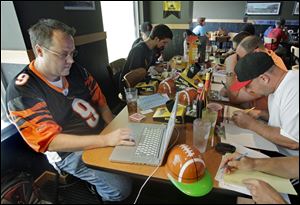
Fantasy football could cost firms over $13 billion
Worker productivity down as Americans manage imaginary teams
8/17/2014
Brian Sherman, left, uses his laptop to record moves in his team's fantasy football draft. Many Americans spend work hours reviewing player statistics and managing their pretend rosters.
CHICAGO — Fantasy football may cost employers more than $13 billion in lost productivity as millions of Americans who spend the season running imaginary football teams spend work hours reviewing player statistics and managing their pretend rosters.
Chicago outplacement consultancy Challenger, Gray & Christmas, which calculated the estimate, emphasized that it “fully acknowledges the absurdity” of trying to put a firm dollar amount on lost work output resulting from the virtual competition.
“We are not trying to demonize fantasy football,” Chief Executive Officer John Challenger said in a statement. “It is important to understand that there are more distractions than ever in today’s workplace. If it’s not fantasy football, it’s the latest Hollywood gossip, shopping on Amazon, or checking Facebook.”
But with fantasy football the topic of some water-cooler conversations and the slow down of a company’s Internet speed as bandwidth goes to researching players, it’s a “massively popular phenomenon that cannot be ignored,” he said.
The firm used the average hourly earnings of workers on private nonfarm payrolls ($24.45) and the estimated number of employed fantasy sports participants (18.3 million, assuming a 59 percent employment rate among the 31 million working-age Americans who participate). Assuming, conservatively, that each participant spends two hours a week on fantasy sports while on the job, it works out to $13.4 billion over the course of the 15-week fantasy football schedule.
With no chance that any measurable dip in GDP would be the fault of fantasy football ($13.4 billion is less than 1 percent of the $1.5 trillion in wages paid out during the same period), Mr. Challenger said firms shouldn’t ban the practice but form leagues.
“An across-the-board ban on all fantasy football or sports Web sites is likely to backfire and cause a drop in morale, loyalty, and, ironically, productivity,” he said. “The end result could be far worse than any loss of productivity.”